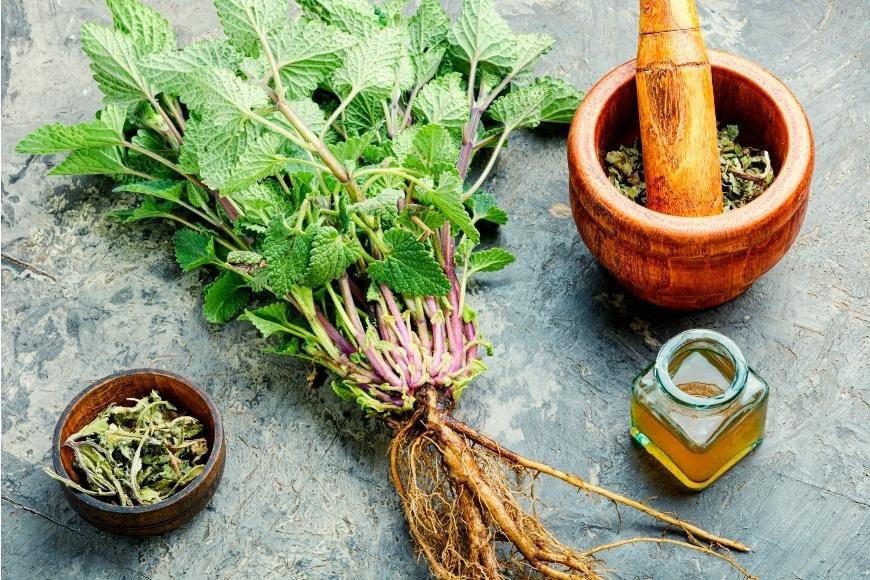How to Use Lemon Balm
In this comprehensive guide, we'll explore the many ways you can use lemon balm to improve your health and well-being.

To begin your journey into the realm of herbal remedies, lemon balm is an ideal starting point to explore its potential benefits. This versatile herb offers numerous benefits and can be easily incorporated into your daily routine. In this comprehensive guide, we'll explore the many ways you can use lemon balm to improve your health and well-being.
Throughout this post, we will discuss what exactly lemon balm is and how it has been traditionally used for centuries. We will then outline methods on preparing lemon balm for use in different forms, such as tea or essential oil. Furthermore, we'll delve into its potential benefits, including stress relief and cold sore treatment.
Ultimately, it is essential to bear in mind that although utilizing natural remedies like lemon balm can be advantageous, there may also be possible adverse reactions or interactions with other compounds. Therefore, our guide will provide information on dosage guidelines and possible side effects associated with using lemon balm.
Table of Contents:
- What is Lemon Balm?
- How to Prepare Lemon Balm for Use
- How to Ingest Lemon Balm
- Frequently Asked Questions How to Use Lemon Balm
- Conclusion
1. What is Lemon Balm?
Lemon balm, scientifically known as Melissa officinalis, is a perennial herb from the mint family that has been used for centuries for its medicinal and therapeutic properties. With its distinct lemony scent and flavor, this versatile plant has found its way into various traditional remedies and modern-day applications.
The history of lemon balm dates back to ancient Greece and Rome, where it was highly valued for its calming effects on the mind and body. It was even said to be used by famous philosophers like Dioscorides who praised it as an elixir of youth (source). Today, lemon balm continues to gain popularity among young adults seeking natural alternatives for relaxation and stress relief.
2. How to Prepare Lemon Balm for Use
To use lemon balm, one can dry, crush or steep it depending on their desired effect. Here, we will discuss the most common methods of preparing lemon balm: drying, crushing, and steeping.
Drying Lemon Balm
To dry lemon balm leaves, follow these simple steps:
- Gather fresh lemon balm leaves from your plant or purchase them from a reputable source.
- Cleanse the foliage with a flow of water to eradicate any dirt or particles.
- Pat the leaves dry with a clean towel or paper towels.
- Spread the leaves out evenly on a flat surface like a baking sheet or tray lined with parchment paper. Make sure they are not overlapping each other.
- Place the tray in an area with good air circulation but away from direct sunlight. Allow them to air-dry for about one week until they become crispy and brittle when touched.
Crushing Lemon Balm Leaves
If you prefer using crushed lemon balm instead of whole dried leaves, here's how you can crush them:
- Gather dried lemon bamlm as described above.Pour small amounts into mortar & pestle - Grind gently by pressing down firmly against mortar then twisting back-and-forth motion; continue process until all pieces reach desired consistency
To conclude, preparing lemon balm for use is a simple and straightforward process that can be done quickly. Moving on to the next heading, let's explore how to ingest this herb.
3. How to Ingest Lemon Balm

Lemon balm can be ingested in various ways, each offering unique experiences and effects. Below are three popular methods of consuming lemon balm:
- Smoking
- Drinking Tea
- Eating Raw or Cooked
Smoking Lemon Balm
Smoking could be a swift solution for experiencing the soothing properties of lemon balm. To smoke lemon balm, follow these simple steps:
- Dry the leaves by hanging them upside down in a cool, dark place for about two weeks.
- Crumble the dried leaves into small pieces.
- Pack a pipe or rolling paper with the crushed leaves.>Some people mix it with other herbs like chamomile or lavender for added relaxation benefits...
- Ignite and inhale slowly and deeply as you would when smoking tobacco or cannabis..- Be aware that this method may cause irritation to your throat and lungs.
Consuming lemon balm can take multiple forms, all depending on the effect sought after. Moving on to the next heading, let's explore the benefits of using lemon balm.
Lemon Balm Tea
Lemon balm tea is one of the most popular ways to enjoy this versatile herb. To make a cup of soothing lemon balm tea:
- Add 1-2 teaspoons of dried lemon balm leaves or 4-5 fresh leaves per cup (240 ml) of boiling water.
- Let the concoction steep for around 10 minutes, then strain out the leaves.
- Sip your tea slowly and savor its calming effects.
If you're new to using lemon balm, start with just one teaspoon or fewer leaves in your tea until you know how your body responds.
Lemon Balm Tincture
Lemon balm tinctures are another popular way to enjoy this herb's benefits, especially for those who prefer not to smoke or drink tea. To use a lemon balm tincture:
- Begin with a low dose of around 2-4 ml (about half to one full dropper) per day, divided into two doses if desired.
- Hold the liquid under your tongue for about 30 seconds before swallowing to allow better absorption.
Start low and adjust as needed to ensure safe usage of lemon balm. Remember that moderation is key when experimenting with herbal remedies like lemon balm.
Safety Precautions When Using Lemon Balm
To ensure that your experience with lemon balm remains positive and free from adverse side effects,
- Beware of Excessive Consumption: Avoid consuming large quantities at once since overconsumption can lead to negative side effects mentioned above.
- Follow Dosage Guidelines: Adhere to the recommended dosage guidelines provided in this article or consult a healthcare professional for personalized advice.
- Pregnancy and Breastfeeding: If you are pregnant or breastfeeding, it's best to avoid using lemon balm as its safety during these periods has not been well-established. Consult your doctor before using any herbal supplements while pregnant or nursing.
In general, being mindful of potential side effects and taking necessary precautions can help ensure that your experience with lemon balm is enjoyable and beneficial. For optimal safety, it is recommended to seek medical advice before adding lemon balm into your routine.
Therefore, it is imperative to be mindful of the potential health implications when taking lemon balm. It is critical to be acquainted with the correct dosage directions for lemon balm before consuming it, as this can have a substantial influence on one's wellbeing.
Frequently Asked Questions How to Use Lemon Balm

How do you use lemon balm plant?
To use the lemon balm plant, first harvest its leaves. You can then prepare it for consumption by drying the leaves and making a tea or tincture, adding fresh leaves to recipes, or using them in essential oil form. Lemon balm is versatile and can be ingested in various ways depending on your preference.
Is it OK to take lemon balm everyday?
Taking lemon balm daily is generally considered safe for most people when used appropriately. However, long-term continuous use may lead to potential side effects such as nausea or abdominal pain. It's recommended to consult with a healthcare professional before incorporating any new supplement into your routine.
Who should not use lemon balm?
Individuals who are pregnant or breastfeeding, have thyroid disorders, or are taking medications that interact with sedatives should avoid using lemon balm without consulting their healthcare provider. Additionally, those scheduled for surgery within two weeks should also refrain from using this herb due to its potential sedative effects.
What does lemon balm do to the brain?
Lemon Balm has been shown to positively impact cognitive function and mood by increasing GABA levels in the brain - an inhibitory neurotransmitter responsible for reducing anxiety and promoting relaxation. This effect makes it popular among users seeking natural remedies for stress relief and improved mental clarity. (source)
Conclusion
Lemon balm is a plant with numerous potential applications, ranging from calming nerves to aiding digestion. It has been known to aid in the relief of stress, sleeping problems and digestive issues. With proper preparation and dosage guidelines in mind, lemon balm can provide the desired effects without any major side effects. While there are no specific rules on how to use lemon balm, it's important to remember that its potency varies from person to person so understanding one’s own body is key when using this herb medicinally or recreationally.






































































































































